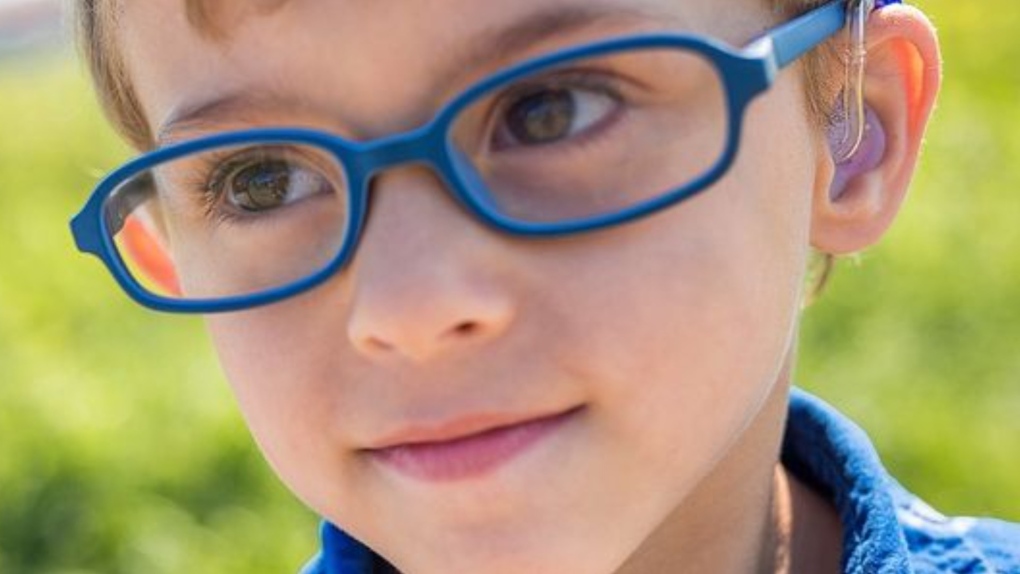1st-in-Canada program launching at UBC to support education, employment of deaf and hard of hearing people
 A young child who requires hearing aids is pictured in a handout photo from the University of British Columbia, which is launching a first-in-Canada program aimed at supporting people with hearing loss.
A young child who requires hearing aids is pictured in a handout photo from the University of British Columbia, which is launching a first-in-Canada program aimed at supporting people with hearing loss.
In a Canadian first, the University of British Columbia has adapted its early childhood education program to support young people who are deaf and hard of hearing (DHH).
The goal of the BC ECE Basic Certificate program is two-fold, according to a release UBC sent out Thursday—to support children with hearing disabilities, as well as adults who are DHH and struggling to find employment.
“The early years are a crucial period for language, learning and social development, yet a shortage of early childhood educators with the expertise to support these children means many do not receive care tailored to their learning needs,” the UBC statement reads.
“The ripple effects of early language deprivation can stretch into adulthood,” it continues.
Data by the Canadian Hard of Hearing Association shows the unemployment rate of people with hearing loss is 32 per cent higher than their fully-hearing counterpart.
Out of that total, only about one in five work full-time, according to CHHA, and 42 per cent are underemployed.
That’s why UBC says its new program will give priority to applicants who experience hearing loss, have a connection to the DHH community or have worked with young children with these specific needs before.
Applications for the September program are open from now until July 3.
After completing the two-year, part-time, hybrid program, graduates will be certified to work as early childhood educators anywhere in B.C.
Lisa Meneian, an educator with experience in early intervention with DHH children, co-developed the course and will be providing weekly support and mentorship to the program’s small cohort.
“Society in general benefits when we have Deaf and hard-of-hearing professionals in the workplace. It strengthens programs. And when we have Deaf and hard-of-hearing children in programs, it strengthens early-learning communities,” Meneian said in the UBC release.
She also highlighted the importance of adult role models for children who experience hearing loss.
Monika Lane, a Parksville mother who has two children who are deaf, as she herself is, says her eldest daughter has suffered due to the lack of specialized educational resources.
“We tried to get an early childhood educator who could work with her but there were none available,” Lane told UBC.
With no other options available, Lane’s daughter was put in a daycare where she was unable to communicate or interact with her peers or staff for a full year. Finally, the daycare received funding to hire an American Sign Language interpreter.
“My children – and other Deaf or hard-of-hearing children in this province – deserve to have early childhood educators who can fully support their language, learning and development needs,” said Lane.
The new program was developed in part thanks to a provincial fund as well as a grant from UBC’s education faculty and support from the school’s accessibility centre.
CTVNews.ca Top Stories

Teenage phenom Gavin McKenna scores, Canada tops Finland 4-0 in world junior opener
Teenage sensation Gavin McKenna scored late in the first period and Carter George made 31 saves for the shutout as Canada picked up a 4-0 victory over Finland in the host country's opener at the world junior hockey championship Thursday.
Ministers Joly, LeBlanc travel to Florida to meet with Trump's team
Two members of Prime Minister Justin Trudeau's cabinet will be in Palm Beach, Fla., Friday to meet with members of Donald Trump's team.
Hwy. 401 off-ramp shut down due to Boxing Day deal-hunters now reopen
A Highway 401 off-ramp west of Toronto that became so clogged up with Boxing Day deal-hunters Thursday that police had to shut it down out of safety concerns has re-opened.
India alleges widespread trafficking of international students through Canada to U.S.
Indian law enforcement agencies say they are investigating alleged links between dozens of colleges in Canada and two 'entities' in Mumbai accused of illegally ferrying students across the Canada-United States border.
Teen actor Hudson Meek, who appeared in 'Baby Driver,' dies after falling from moving vehicle
Hudson Meek, the 16-year-old actor who appeared in 'Baby Driver,' died last week after falling from a moving vehicle in Vestavia Hills, Alabama, according to CNN affiliate WVTM.
B.C woman awarded nearly $750K in court case against contractor
A B.C. woman has been awarded nearly $750,000 in damages in a dispute with a contractor who strung her along for a year and a half and failed to complete a renovation, according to a recent court decision.
Florida pizza deliverer charged with stabbing pregnant woman after tip dispute
A pizza deliverer in central Florida has been charged with pushing her way into a motel room with an accomplice and stabbing a pregnant woman after a dispute over a tip, authorities said.
2 minors, 2 adults critically injured in south Calgary crash; incident was preceded by a robbery
Multiple people were rushed to hospital, including two minors, in the aftermath of a serious vehicle collision on Thursday morning.
Christmas Eve stowaway caught on Delta airplane at Seattle airport
A stowaway was caught trying to nab a ride on a Delta Air Lines plane at Seattle-Tacoma International Airport on Christmas Eve.































